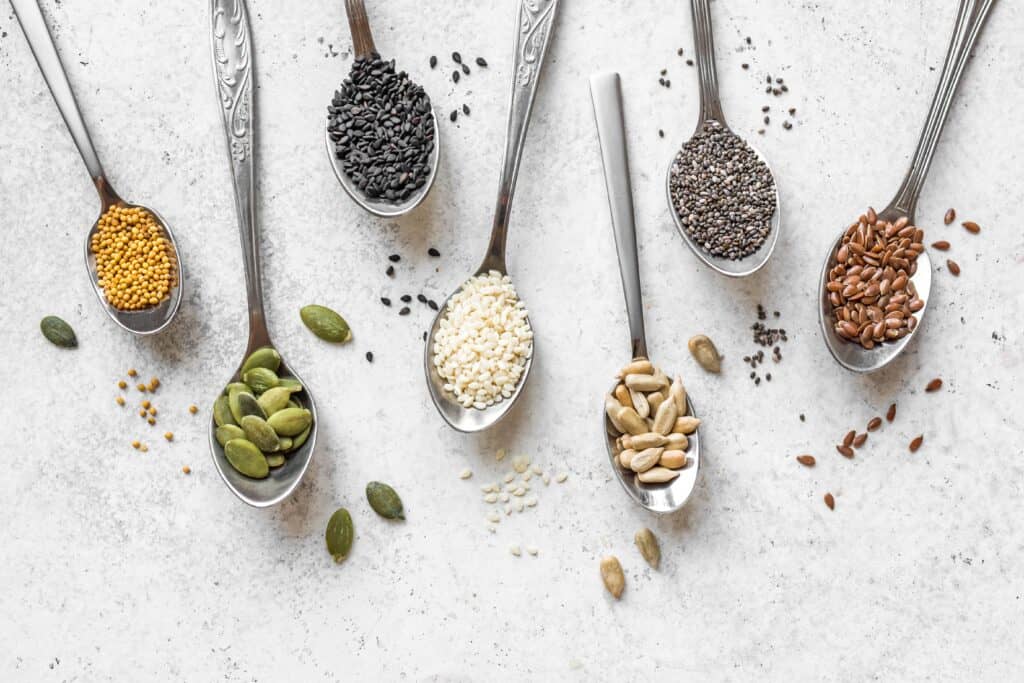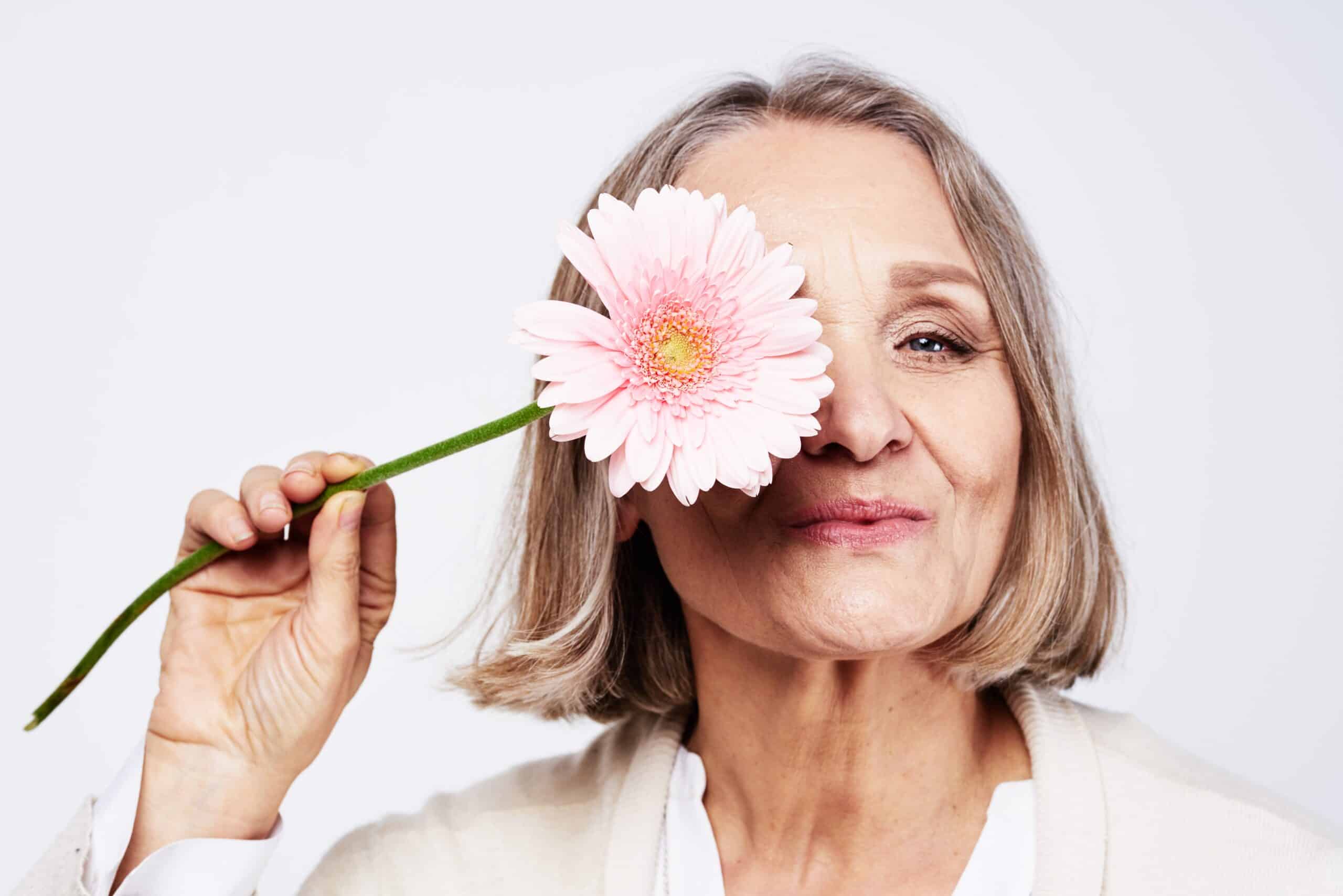The science behind seed cycling and regulating your hormones
Seed cycling has sparked interest online over recent years as a way to potentially optimise our hormone levels.
Many have claimed its value in helping them to balance the symptoms that we face over our monthly cycles. Others have reported it to have boosted their fertility or reduced the severity of menopausal symptoms.
But how effective can the consumption of specific seeds be for our reproductive health, and what is the research behind it? Read our article to find out more.
What is seed cycling?
Seed cycling comes under the branch of naturopathic or alternative medicine and is a practice thought to help regulate hormone levels in people who have periods. (1)
During seed cycling, the diet is supplemented with four different seeds: flax, pumpkin, sesame and sunflower, grounded to aid nutrient absorption and eaten raw each day. (1)
In the first phase of the cycle, known as the follicular phase, a mixture of pumpkin and flax seeds are consumed at the amount of 1 tablespoon (tbsp) per day. (2) This is usually from around day one (the start of your period) to about day fourteen or ovulation. This phase is when eggs are ripening and is thought to balance oestrogen levels. (3)
Following this, a 1 tbsp blend of ground sesame and sunflower seeds is consumed daily from approximately 14-28 of the cycle during the luteal phase. These seeds are believed to boost progesterone levels. The seeds are believed to contain optimal amounts of nutrients, fats, and vitamins that help to best support hormonal function in the body. (2)
For those who are going through or have gone through menopause, it is recommended to follow the moon’s cycles for guidance, which similarly last 27-29 days. (2)
What are the supposed benefits of seed cycling?
As well as aiding in hormone levels and regulating period cycles, seed cycling has been said to improve acne, ease fatigue and mood swings, and improve thyroid hormone levels.
Furthermore, many have claimed it to better menopausal symptoms such as hot flushes, night sweats and aided with hair health and cellulite. (2)
What does the research say?
As diet and nutrition professionals, it is vital for us to look at the literature on any topic before making recommendations to clients or patients. Evidence-based research holds far greater strength in being valid and reliable as opposed to word-of-mouth or anecdotal claims.
There remains to be no evidence or studies undertaken on the seed cycling method, so we cannot claim its effectiveness from a scientific viewpoint. Most of the perspectives we hear about are simply anecdotal, which we know is not always a reliable form of evidence as it merely lacks data and numbers.
There is a discrepancy between the claims made on the benefits of seed cycling. Remember that some changes to your menstrual cycle are expected, and it is normal to experience different changes and symptoms to your friends or family members. (2)
Although there is no consistent data around the benefits of seed cycling, there also probably may not be any dangerous or detrimental effects of incorporating more seeds in your diet.
Some small studies undertaken on women have shown that flaxseed intake may regulate cycles and reduce breast pain. (4) However, other research surrounding the oestrogen promoting and inhibiting effects remain unclear. (5)
Should I try seed cycling?
Whilst we don’t recommend this specific method due to the lack of research and its uncertain benefits, seeds remain to be a fantastic source of mono and polyunsaturated fatty acids and protein.
Furthermore, consuming a range of seeds provides essential vitamins such as E and B6 and minerals such as calcium, magnesium, and zinc, which play fundamental roles in reproductive health. (6, 7, 8, 9) However, studies show neither zinc nor vitamin E has shown to impact hormone levels or improve menopausal symptoms. (10, 11)
Remember – not one food will have all of the nutrition, and no food has zero nutrition. Seeds can absolutely be enjoyed as a part of a varied and balanced diet, and consuming a tablespoon a day is not considered excessive.
Still, like all other foods, they are NOT a ‘superfood’ (it’s just a marketing term!), and other food groups such as whole grains, fruits, vegetables, dairy (or dairy alternatives) and protein sources should also form the basis of your diet.
As always, we are passionate about eating intuitively and embracing all of the foods we love as a part of our meals and snacks too – some foods bring us emotional and cultural values that a green juice or salad may not always offer, and that is perfectly normal and even worthy of celebrating!
We know that reproductive health can be a difficult area to navigate, so feel free to get in touch with us to explore this further via a consultation. You can also check out our other articles on optimising your nutrition for fertility, and steps to get your period back.
Be mindful of your body, and if you are facing any symptoms that may be aligned with polycystic ovarian syndrome (PCOS), endometriosis, irregular bleeding, infertility, or amenorrhoea (the absence of periods), then it may be best to speak to your GP as soon as possible to help to diagnose and/or work with these conditions.
If you already have a diagnosis or suspected PCOS, why not read about how to manage symptoms without restricting your diet?
Finally, take short a moment to remind yourself of all of the amazing recovery you are making with each day. Just by reading this, you are a person who is full of courage, curiosity, and kindness.
If you enjoyed this article and want to read more, please get in touch with us and let us know other topics you would like us to cover in the future!
Priya Chotai, BSc ANutr
EHL Team x
References
Toler, S. Seed Cycling: I tried it. (And dug into the research on whether it works.) Clue 2020 Jan 28. Available at: https://helloclue.com/articles/culture/seed-cycling-i-tried-it-and-dug-into-the-research-on-whether-it-works
Healthline., Can Seed Cycling Balance Hormones and Ease Menopause Symptoms?Available at: https://www.healthline.com/nutrition/seed-cycling#effectiveness
Jabbour HN, Kelly RW, Fraser HM, Critchley HO. Endocrine regulation of menstruation. Endocr Rev. 2006 Feb;27(1):17-46. doi: 10.1210/er.2004-0021. Epub 2005 Sep 13. PMID: 16160098.
Phipps WR, Martini MC, Lampe JW, Slavin JL, Kurzer MS. Effect of flax seed ingestion on the menstrual cycle. J Clin Endocrinol Metab. 1993 Nov;77(5):1215-9. doi: 10.1210/jcem.77.5.8077314. PMID: 8077314.
Rodríguez-García C, Sánchez-Quesada C, Toledo E, Delgado-Rodríguez M, Gaforio JJ. Naturally Lignan-Rich Foods: A Dietary Tool for Health Promotion? Molecules. 2019 Mar 6;24(5):917. doi: 10.3390/molecules24050917. PMID: 30845651; PMCID: PMC6429205.
Kontic-Vucinic O, Sulovic N, Radunovic N. Micronutrients in women’s reproductive health: I. Vitamins. Int J Fertil Womens Med. 2006 May-Jun;51(3):106-15. PMID: 17039854.
Kontic-Vucinic O, Sulovic N, Radunovic N. Micronutrients in women’s reproductive health: II. Minerals and trace elements. Int J Fertil Womens Med. 2006 May-Jun;51(3):116-24. PMID: 17039855.
Traber MG. Vitamin E inadequacy in humans: causes and consequences. Adv Nutr. 2014 Sep;5(5):503-14. doi: 10.3945/an.114.006254. PMID: 25469382; PMCID: PMC4188222.
Favier AE. The role of zinc in reproduction. Hormonal mechanisms. Biol Trace Elem Res. 1992 Jan-Mar;32:363-82. doi: 10.1007/BF02784623. PMID: 1375078.
Sunar F, Gormus ZI, Baltaci AK, Mogulkoc R. The effect of low dose zinc supplementation to serum estrogen and progesterone levels in post-menopausal women. Biol Trace Elem Res. 2008 Dec;126 Suppl 1:S11-4. doi: 10.1007/s12011-008-8211-y. Epub 2008 Aug 31. PMID: 18759067.
Kronenberg F, Fugh-Berman A. Complementary and alternative medicine for menopausal symptoms: a review of randomised, controlled trials. Ann Intern Med. 2002 Nov 19;137(10):805-13. doi: 10.7326/0003-4819-137-10-200211190-00009. PMID: 12435217.














